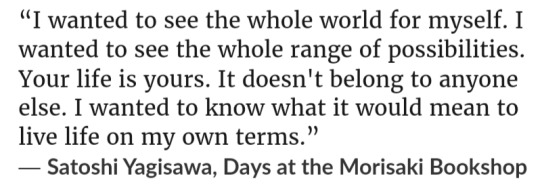#satoshi yagisawa
Text
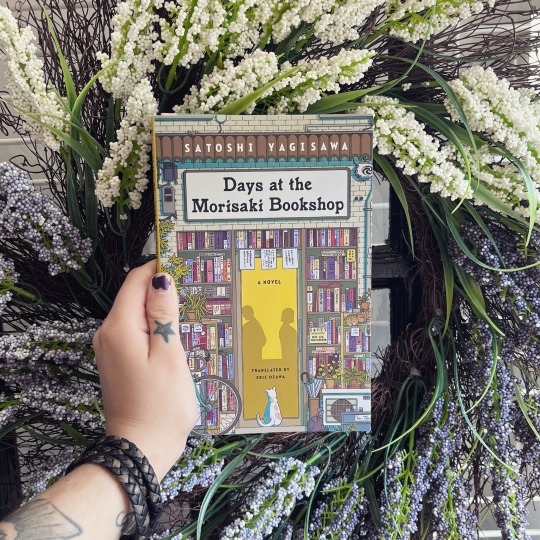
📚 Days at the Morisaki Bookshop by Satoshi Yagisawa (trans. Eric Ozawa)
Rating: ⭐️⭐️⭐️⭐️/5
Twenty-five year old Takako breaks up with her boyfriend and quits her job, but she’s hesitant when her uncle Satoru wants her to come live above his bookshop and help him out. Things begin to change and as these two relatives are ready to move on, figures from their pasts start to resurface.
This book had the perfect pace for the story it was telling, it had such personable characters, it has an eccentric bookstore, it has so much character development and the story just moves so greatly. I really loved the bits and pieces of comedy throughout the book. At first I thought it was cheesy, but I quickly grew to love it.
If you’re looking for a low-key, reflective book then this one is perfect!
#godzilla reads#days at the morisaki bookshop#satoshi yagisawa#Eric Ozawa#book review#reading#japanese literature#book blog#Japanese lit#booklr#bookworm#bookish#booklover
155 notes
·
View notes
Text
It’s funny. No matter where you go, or how many books you read, you still know nothing, you haven’t seen anything. And that’s life.
- Satoshi Yagisawa, Days at the Morisaki Bookshop
#book quotes#books#life#life quotes#tumblr milestone#book tumblr#tbr#literature#japanese#japan#japanese literature#japanese novel#satoshi yagisawa#days at the morisaki bookshop
112 notes
·
View notes
Text

JOMP BPC - 23rd April - Spring Time
Days at the Morisaki Bookshop, nestled in amongst the apple blossom. The protagonist, a young woman called Takako, starts an important new phase of her life in the spring.
#jompbpc#justonemorepage#books#reading#days at the morisaki bookshop#satoshi yagisawa#apple blossom#blossom#spring flowers#spring
25 notes
·
View notes
Text
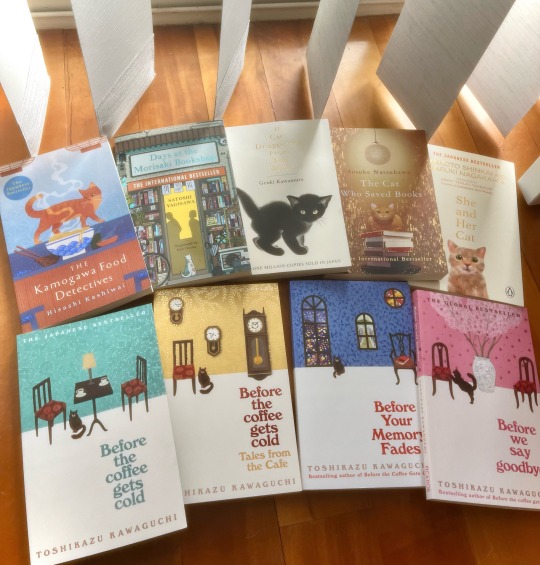
Japanese books with cats on the cover 🐈
#the kamogawa food detectives#hisashi kashiwai#days at the morisaki bookshop#satoshi yagisawa#if cats disappeared from the world#genki kawamura#the cat who saved books#sosuke natsukawa#she and her cat#makoto shinkai#naruki nagakawa#before the coffee gets cold#toshikazu kawaguchi#japanese literature#japanese lit#cats#books#asian literature#bookblr#reading
18 notes
·
View notes
Text
There was a theme in my latest bookmail. 📚🐈🐈⬛

#book mail#books#what you are looking for is in the library#michiko aoyama#alison watts#days at the morisaki bookshop#satoshi yagisawa#eric ozawa
43 notes
·
View notes
Text
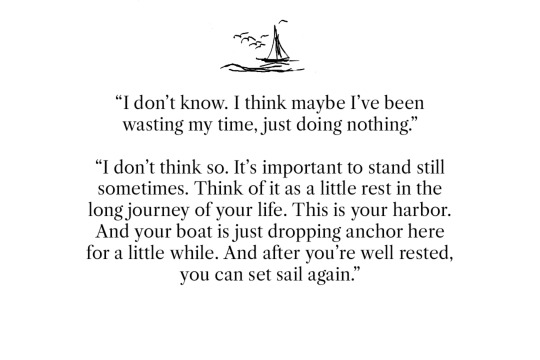
– Satoshi Yagisawa, Days at the Morisaki Bookshop
#book quote of the day#satoshi yagisawa#days at the morisaki bookshop#breakups#books about books#japanese author#contemporary fiction#romance#short reads#book recommendations
29 notes
·
View notes
Text
Days at the Morisaki Bookshop

Do you ever find yourself with *finally* enough time to read, but then you don't? Do you ever settle for the evening with the determination that you're going to read, but you end up scrolling through Instagram instead, AGAIN?
I have a lot of free time these days. Ever since my last contract ended in July 2023 and my trip to Hokkaido from September-December, I have been looking for a job. The market is tough these days, and the publishing industry in my country seems to be rather reluctant in hiring new people - let alone women in their late 20s/early 30s who might pop out a kid in the near future. And although I have zero ambition to have children anytime soon, they naturally throw me into one pot with other women and decide they'd rather hire a man or no one.
So that is where I am at the moment. Living with my parents, with enough time on my hands, writing job applications, trying to not go insane. You see, I have a lot of spare time on my hands these days.
Then why do I not use it to read through the pile of shame that I have amassed?
My attention span has become ridiculously short and fanfiction is always a safe bet. I know the characters, I know what I am getting into, I know the deal. This is why I also love writing fanfiction so much. But besides reading fanfiction, I should read more of the books I actually spent (a lot of) money on. For some reason, some reading energy came over me, and here we are. I remembered this blog and thought I should just do it. Give it a try. Write about the things that I read and maybe write some reviews, perhaps that will inspire me to read on and on and on.
So here we are with Satoshi Yagisawa's "Days at the Morisaki Bookshop".
Synopsis: The story follows Takako, a young woman living in Tokyo, heartbroken after her boyfriend tells her he is going to marry someone else. Depressed and overwhelmed, she quits her job, and her uncle Satoru calls her from the family's bookshop, asking if she didn't want to stay with him for a while and work at the shop for a bit. At first, Takako is not a fan - she is not a reader, she does not know what the fuss is all about and why people love a second-hand-bookshop of all places. Slowly, she begins to embark on her own reading journey and finds a new footing and new interests, until all of a sudden, her aunt Momoko comes back into her and her uncle's lives.
My experience with Japanese literature is very limited. I tried to read Haruki Murakami a few years ago and threw the book against the wall because I found it too exhausting. I also tried Banana Yoshimoto a few years ago but I cannot remember if I finished it. I have read far more manga, translated into English or German. While I was living in Japan, one of my housemates turned out to be a fellow graduate of literary studies and she had written her thesis about some pieces of Japanese literature. She loved it so much that I was determined to also give it a try, and she told me what to watch out for. I am not sure if I caught all the things that are to discover in "Days at the Morisaki Bookshop", but what I caught was very delightful.
One does not need to know Japanese culture or have been to Japan in order to read/understand Yagisawa's novel. In fact, I find it an incredibly easy way to look into Japanese society for people who have never been there; it is like a window that welcomes everyone to stand in front of it and look through. When one imagines Tokyo, there's usually Shibuya Crossing and lots of people, lots of lights and billboards, lots of noise. The Tokyo that Yagisawa presents to the reader is a surprisingly quiet one: Jimbōchō. I have never been to this part of Tokyo, but after reading the novel, I imagine this book-town of Tokyo as very similar to the other narrow streets and lanes that I have wandered down during my time in Japan. It is the magic that you can find in every large city in Japan: bustling life, lots of noise, a sensory overload; but as soon as you turn around the corner into another lane, the sound of the city disappears, and you are in a quiet sphere. This is the atmosphere that Yagisawa masterfully creates in this novel, allowing the reader to step off the train together with Takako, entering the quiet and musty world of books.
For any book lover, the mere description of the Morisaki Bookshop is a delight. When Takako first enters the shop, she describes the smell as "musty", which slightly embarrasses her uncle. Her naiveté in this utterance is charming as it is almost ridiculous to any book worm: we all know what kind of smell she is referring to, and we would never call it musty. We would simply call it the smell of a book shop or, more precisely, the smell of old books. Although Takako is, in the beginning, "not one of us", she does not make herself unlikeable by pointing out what annoys her about the bookshop. They are fair observations, such as a packed room full of books that is supposed to be her bedroom, or the fact that she can't really find anything in the bookshop. She does not feel superior all of a sudden when she eventually picks up one of the many books and starts reading, and she is not ashamed of admitting that she has now added reading to her hobbies. It expands her world and gives her, as she puts it, the kick in the butt that she needs. She finds a new life, and new love, but most importantly, she keeps going for her own sake. She does not have the perfect happy ending - if the book has a happy end at all. It ends in a rather abrupt way.
I was not sure what to think of the Momoko subplot. Takako's aunt, who has left her uncle Satoru years ago and suddenly returns in an almost dramatic way that screams "tadaahh!!!", seems like a strange intrusion in the second part of the novel that is simply titled "Momoko Returns". Takako pretty much mirrored me, the reader, when Momoko suddenly showed up - she does not know what to do with the woman that is suddenly there and takes over the little life that Satoru and Takako have crafted for themselves, and neither of them are brave enough to ask. Later, Momoko invites Takako to a girl's trip to a place she used to work at, and during their trip, she opens up briefly towards Takako about her reasons for returning. Her reasons make sense but also appear selfish to the reader, which Takako agrees on. She tears the note that Momoko leaves for her after running away again into shreds, then tells her uncle to run after her this time, or it will be too late. She kicks both uncle and aunt in the butt this way, no longer willing to be the intermediary between them (agreed tbh).
The novel often makes it seem as if Takako is merely living for other people. In the beginning, this is most definitely true. She is living for her shitty boyfriend Hideaki, then for her uncle, then for her friends Takano and Tomo, setting them up as a couple. As soon as she receives her own kick in the butt to get her own life back on track, Takako starts living for herself again - slowly, with hesitation, but much less afraid than before. When she finally meets Wada, a customer, fellow bookworm, and nursing a broken heart similarly to Takako in the beginning, she is not sure whether or not to allow herself to think about him. She is not even sure if she has actual feelings for him or if she is just pretending, which is an incredibly refreshing take in literature. Love and romance, and feelings in general, are not always clear-cut, and the novel reflects this. Not even Wada seems to be sure what to think of her, and the way they find together, through some minor misunderstanding, is lovely to witness. Personally, I would have liked to read more of their love story, but that is not the point of the novel.
Takako is an interesting main character as she seems to follow the reader in their experience. I was often taken aback and shocked, only to find that two lines down, Takako expresses the same feelings. At the same time, it does not feel as if the reader is taken by the hand by the narrative to come to certain emotional conclusions. If anything, it shows that feelings and emotions are valid, even if it takes a while to understand them, like Takako does. It takes her several chapters to finally realise how angry she is with Hideaki and the way he treated her, and she allows her anger to come through fully when Momoko runs away yet again. It was interesting to check on myself during the reading process: "What does this scene do with me? Alright. I feel anger. Let's read on and see how Takako thinks about it." Personally, I don't think I have experienced something like that before in reading.
The world in the novel, and the society in it, is a Japanese one. I am somewhat familiar with the culture due to my stay in Sapporo, and due to my (albeit limited) understanding of the language. It enhances the experience of reading this little gem of a novel, but it is absolutely not necessary. If anything, the novel takes the reader to a Japan that is not the one we always see represented in Western media. The Japan that Satoshi Yagisawa presents us is quiet, calm, peaceful, with a musty smell, a strong sense of community, women who don't give a shit about what old people think of them, and an incredible serenity in the form of Uncle Satoru that makes the reader want an uncle like him to talk about books with.
7 notes
·
View notes
Text
Don’t be afraid to love someone. When you fall in love, I want you to fall in love all the way. Even if it ends in heartache, please don’t live a lonely life without love. I’ve been so worried that because of what happened you’ll give up on falling in love. Love is wonderful. I don’t want you to forget that. Those memories of people you love, they never disappear. They go on warming your heart as long as you live.
— Satoshi Yagisawa, Days at the Morisaki Bookshop
#booklover#bookish#bookworm#booklr#bookstagram#bibliophile#booknerd#booktok#bookblr#books#book#japanese literature#satoshi yagisawa#days at the morisaki bookshop
17 notes
·
View notes
Text

Current read 📚 🫶🏼
#i know this is pretty of topic#but i always strive to truly post whatever i want here#and right now i want to post my books#current read#days at the morisaki bookshop#satoshi yagisawa#eric ozawa#life
22 notes
·
View notes
Text
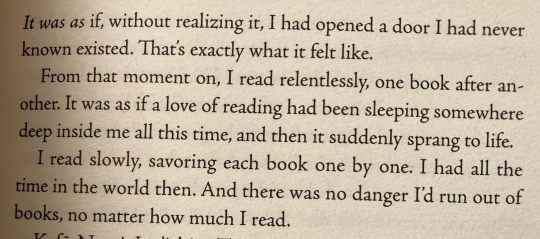
“Days at the Morisaki Bookshop” by Satoshi Yagisawa, translated by Eric Ozawa
#days at the morisaki bookshop#satoshi yagisawa#eric ozawa#quotes about reading#quotes about books#quotes about literature
8 notes
·
View notes
Text

I picked up Days at the Morisaki Bookshop on a whim in a sale, I think that might have been fate. Recently I’ve found myself drawn to books that feel grounded in reality, with characters who feel so three dimensional that I could have met them in the real world rather than within the pages of a book. That is how I felt about the protagonist Takako and all of the people she meets, even those who don’t play a major role in the narrative. For a book that sits at just under 150 pages it does not feel rushed at all. I found myself fully emerged in the world. A story about finding meaning within yourself through connection with others. It was full of fun references to other Japanese greats such as Osamu Dazai, Jun’ichirō Tanizaki, Ryūnosuke Akutagawa and Sōseki Natsume (to name only a few). This was a delightful read and I would highly recommend it. I’m sincerely hoping it’s sequel will be given a translation as I would love to read more from Yagisawa.
#booklr#books#books and reading#book review#days at the morisaki bookshop#satoshi yagisawa#novella#japanese literature#osamu dazai#ryūnosuke akutagawa#jun’ichirō tanizaki#Sōseki Natsume
17 notes
·
View notes
Text
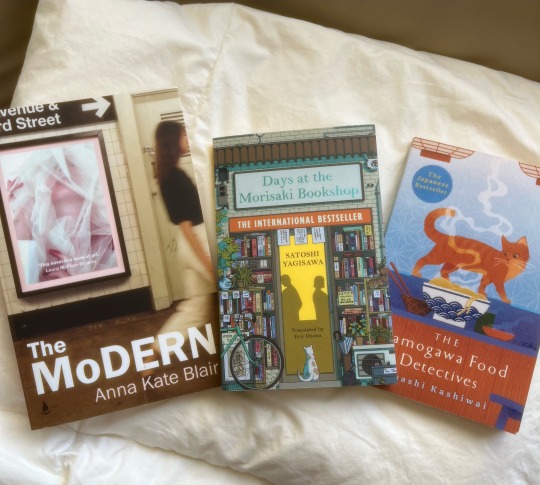
November reads 🫡 how is it December already!?
#2023 reads#November 2023#why do so many Japanese books have cats on the cover lol#the modern#Anna Kate Blair#days at the morisaki bookshop#satoshi yagisawa#the kamogawa food detectives#hisashi kashiwai#books#reading#bookblr#bookstagram#japanese lit#japanese literature
10 notes
·
View notes
Text

#aesthetic#quotes#words#passages#life#life quotes#lines#read#lit#books#days at the morisaki bookshop#satoshi yagisawa
8 notes
·
View notes
Text

Tax-free recruits from 2 weeks ago
8 notes
·
View notes

